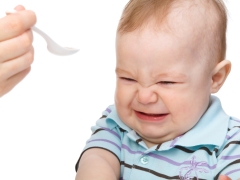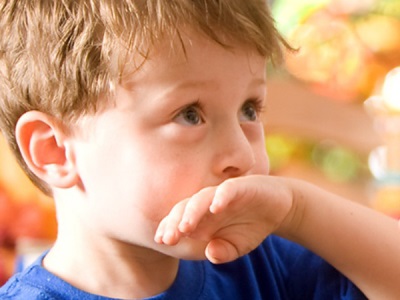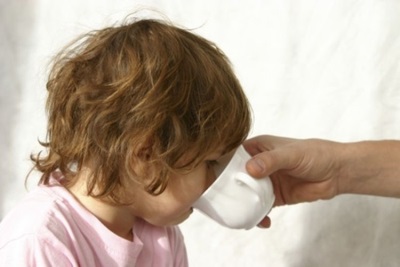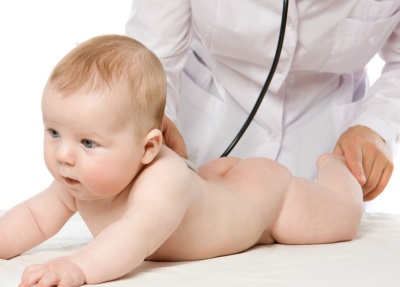Vomiting after eating in a child
Vomiting can occur with a variety of health problems. In this case, most often it appears after the child has eaten. This is very frightening to parents, especially if the child is very small. Why, after eating, can vomiting suddenly begin and what should be done when this symptom appears to parents?
How does it manifest itself?
Vomiting is a reflex process, in which everything that is in the child's stomach is thrown out of it through the mouth, and sometimes through the nose. Before an attack of vomiting, the child usually feels unwell - he turns pale, feels nauseous and retching, his limbs feel cool to the touch.
Symptoms and possible causes, what to do?
Vomiting that occurs after eating can be either a non-dangerous symptom or one of the manifestations of serious pathologies. This type of vomiting can occur in even the youngest children, and in older children. At the same time, it is important in infants of the first year to distinguish vomiting from regurgitation rather common in infancy. Vomiting will be characterized by a deterioration in the general condition of the baby and the appearance of other signs of illness. Consider the causes of this symptom in more detail:
Cause | Manifestations in a child | Parenting |
Over feeding or force feeding | A single episode of vomiting after eating, the general condition of the child is usually not disturbed. | If the situation is rare, treatment is not required, but the diet should be adjusted. |
New Food Intolerance | Single vomiting after drinking an unfamiliar product, may change stool. | Contact a pediatrician to clarify the causes of vomiting, refusal of products that provoke such an organism reaction. Carefully introduce new products to the menu, feed your baby only fresh food. |
Intestinal infection or poisoning | Vomiting (usually repeated), high temperature, loose stools. | Call the pediatrician and start giving the baby enough drink in the form of saline solutions. |
Food allergies | Vomiting after eating a certain product, changes in the skin (rash, swelling, itching), restless behavior, change in stool. | Contact a pediatrician and consult on treatment, and also exclude products that cause a reaction. |
Pyloric stenosis | Vomiting in newborns with undigested milk after each meal after 15 minutes, significant weight loss, symptoms of dehydration. | Contact the surgeon without delay, as this pathology is treated promptly. |
Pilorospasm | Periodic poor vomiting, insufficient weight gain. | Seek medical attention, examine the child and adjust its nutrition. |
Brain damage (meningitis, trauma, encephalitis, congenital abnormalities, tumors) | Multiple bouts of vomiting, after which the child’s condition does not improve, as well as various neurological symptoms (severe headaches, tremors, convulsions, and others) | To show the baby to a pediatrician and a neurologist to further examine the child and prescribe the necessary treatment. |
Acetonemia | Multiple episodes of vomiting, fever, pain in the abdomen, the characteristic smell of urine of a child. | Call the pediatrician at home, make a test for acetone in the urine and start giving the crumbs of medicine with glucose. |
Psychogenic factor | Single vomiting, sometimes diluted stool joins 1-2 times. | Continue to monitor the child, try to prevent situations that may affect the psyche of the baby. |
Infectious respiratory diseases | Fever, vomiting after eating, cough, sore throat and other symptoms. | Call the pediatrician to prescribe the desired treatment. |
Vomiting, acute abdominal pain, nausea, weakness, intense crying, slight fever. | Immediately call an ambulance to provide medical assistance to the child as soon as possible, since this disease poses a great danger in childhood (it is distinguished by high mortality). |
When do I need to go to the doctor?
If a child has vomiting suddenly after eating, you should observe the behavior and condition of the baby. In cases when, after vomiting, the baby's temperature rises, liquid stool appears, the baby becomes sluggish or other symptoms of indisposition develop, consult a doctor.
Before being examined by a doctor, you can only start giving small portions of fluid (for children older than one year, Regidron).
Especially to hurry with the call of a doctor should be in such situations:
- Vomiting does not stop, but repeated many times.
- The child began to dehydrate.
- The baby's consciousness is impaired.
- Diarrhea joined the vomiting after eating.
- The child has a fever.
- Before the appearance of vomiting, the child drank the medicine.
- The kid is very excited.
- Before vomiting, the child ate canned foods or mushrooms.
- The child has a bad stomach ache.
- The baby had no chair for more than 12 hours.
- In the feces, you notice blood.
Treatment
Before the arrival of the doctor, give the child only saline solutions and other drinks to prevent the onset of dehydration. Read more about what can be given to children from vomitingread in another article. Inspection and examination will confirm the cause of vomiting, depending on which treatment will be prescribed. Sometimes it is necessary to treat a child in the hospital, especially if he has a severe intestinal infection or surgical pathology.
Tips for parents
- Tips for parentsWhen vomiting occurs after eating for some time, you should not give food to a child. The exception will be infant babies who can continue to be fed either with mother's milk or a mixture.
- If the baby’s condition has not deteriorated and the vomiting does not recur, after a few hours you can offer the baby something liquid and non-greasy, such as mashed potatoes or porridge. It is advisable to contact the pediatrician the next day for an examination of the baby and an appointment for an examination to make sure that there are no serious health problems.
- If vomiting persists again, call the doctor. Depending on the cause of the ailment, you and your child may be put in hospital.
- It is important that you stay calm, even though vomiting in a small child always looks frightening. Remember that kids sensitively catch the mood of mom and dad, and if you start to panic, this condition will be transmitted to the baby.













